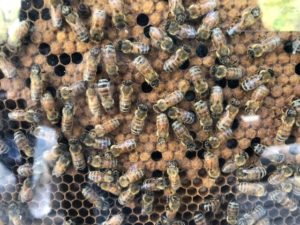Honey Bees
Honey bees are one of the most popular and well-known species of insects. Many people are well aware of their function in the larger ecosystem as well as the recent decline in honey bee population.
While honey bees are not known to be a threatening or problematic pest, it can still be concerning for homeowners if large numbers of the bees are appearing in and around your home.
In such cases, the most relevant questions are these: can honeybees be a pest? And what should homeowners do if they are dealing with unusual honey bee activity?
To answer these questions, it is important to explain in more detail the lifestyle habits of these bees. Honey bees are social insects, and in the wild, they will often establish nests in dark, secluded voids such as tree trunks or in the crevices between rocks.
These nests center around a queen who serves to produce new bees to support the colony. In turn, the worker bees that she produces gather nectar from flowers which they use to create the honey that feeds the young and the queen. The queen has a rapid reproductive rate, producing more than 2,000 bees per day in some instances.
Honey bee colonies are built out of a waxy substance that is produced by the workers using specialized glands. The bees will chew this material to make it malleable, and then use it to form the nest itself. The internal structure of the hive is divided into cells, some of which house the young, developing bees.
During the early summer (or late spring depending on the region) the honey bee queen will leave her original nest along with thousands of workers and seek out a new nesting site. This can lead the bees into close proximity to your home.
Your property can often provide honey bees with a very comfortable environment. They will often settle near an area with a large number of pollen-producing plants. This can lead them to nest near to gardens, potted plants, and window boxes.
It can sometimes be difficult to distinguish honey bees from other pests such as carpenter bees or yellow jackets. The best way to do so is to look at their size and coloration. Honey bees grow to around 15mm in length as adults, and they have a striped golden and brown coloration. They are significantly smaller than bumblebees and can be distinguished from carpenter bees due to their “hairy” bodies.
If you are seeing large numbers of honey bees around your property, you may be justifiably concerned about the risk of being stung. Honey bees can and will sting if threatened. While they are not normally aggressive, they will sometimes attack people or pets if they come into close proximity of a nest.
Naturally, this can create a considerable risk, especially for those who are allergic to bee stings. However, honey bees cannot be dealt with using the methods you might employ against other stinging insects.
Honey bees serve a critical function as pollinators, and their impact on a local ecosystem is often substantial. If the honey bee population in an area is depleted, plants in that area will be less easily able to procreate and continue to thrive. Due to this, many states have regulations protecting honey bees, and this means that they cannot and should not be dealt with using pesticide treatment measures.
In compliance with this, pest control companies (including us here at Canton Termite and Pest Control) cannot legally treat your home for honey bees.
But the fact remains that honey bees can present a threat if they are too close to your home. Therefore, if you are concerned about a hive near to your home, you should call in a professional beekeeper to inspect and potentially remove the nest.
At Canton Termite and Pest Control, we understand that it can be difficult for homeowners to find a reliable beekeeping service. As part of our commitment to keeping your home pest free, we are happy to recommend a reliable beekeeping service should you be dealing with a honey bee problem.
If you are dealing with any insect or wildlife pests, we will also be happy to schedule a FREE inspection to identify your pest problem and determine the best strategy for fast, effective, and safe treatment! We have decades of experience in the pest industry, and we are confident that we will deal with your pest problems to your complete 100% satisfaction, or your money back!
So if you are ready for a friendly, reliable, and risk-free pest control option, give us a call today at 770-479-1598!
By: Tim

